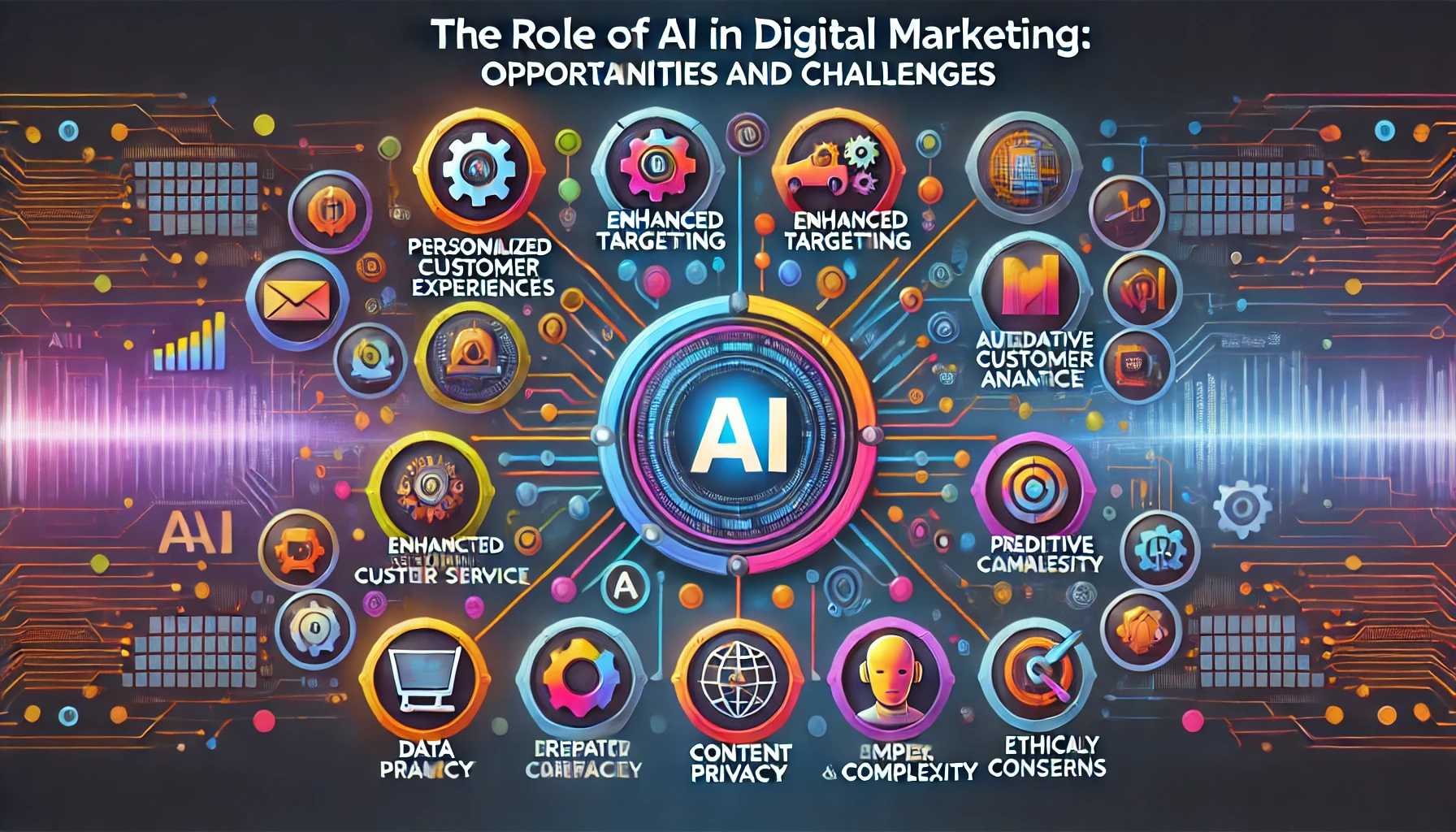The 8 Roles of Artificial Intelligence in Digital Marketing: Opportunities and Challenges
Artificial Intelligence (AI) is transforming digital marketing by offering new opportunities and presenting unique challenges. Understanding the role of AI in digital marketing helps businesses harness its potential while navigating its complexities. In this comprehensive guide, we will explore the opportunities AI brings to digital marketing and the challenges it presents.
Opportunities of Artificial Intelligence in Digital Marketing
AI offers numerous opportunities to enhance digital marketing strategies, improve customer experiences, and drive better results. Here are some key opportunities:
- Personalized Customer Experiences: AI analyzes customer data to deliver personalized content, recommendations, and experiences. This increases engagement and conversion rates.
- Enhanced Targeting: AI-driven algorithms optimize ad targeting by identifying the most relevant audience segments based on behavior, demographics, and interests.
- Automated Customer Service: AI-powered chatbots and virtual assistants provide instant, 24/7 customer support, improving response times and customer satisfaction.
- Predictive Analytics: AI uses predictive analytics to forecast trends, customer behaviors, and campaign outcomes, allowing marketers to make data-driven decisions.
- Content Creation: AI tools can generate content, such as articles, social media posts, and product descriptions, saving time and resources for marketers.
Internal Link: For more insights on optimizing your marketing strategy, check out our article on How to Use Marketing Automation to Streamline Your Campaigns.
Personalized Customer Experiences with Artificial Intelligence
AI enables businesses to create highly personalized customer experiences, which are essential for building brand loyalty and driving conversions.
- Dynamic Content: AI algorithms dynamically generate personalized content for individual users based on their preferences and past interactions.
- Recommendation Engines: AI-powered recommendation engines suggest products, services, or content tailored to each user’s interests, increasing the likelihood of conversions.
- Behavioral Targeting: AI tracks user behavior to deliver targeted ads and messages that resonate with specific audience segments.
Enhanced Targeting and Optimization
AI enhances ad targeting and optimization, ensuring marketing efforts reach the right audience at the right time.
- Lookalike Audiences: AI identifies lookalike audiences that share characteristics with your existing customers, expanding your reach to potential new customers.
- Real-Time Bidding: AI automates real-time bidding for ad placements, optimizing bids to maximize ROI and ensure ads are shown to the most relevant audience.
- Performance Analysis: AI continuously analyzes campaign performance and makes real-time adjustments to optimize results and reduce wasted ad spend.
External Link: To stay updated on the latest AI trends in marketing, visit AI Trends.
Automated Customer Service
AI-driven customer service tools provide efficient and effective support, enhancing the overall customer experience.
- Chatbots: AI-powered chatbots handle common customer inquiries, providing instant responses and freeing up human agents for more complex issues.
- Virtual Assistants: Virtual assistants offer personalized assistance and recommendations, improving customer satisfaction and loyalty.
- 24/7 Availability: AI tools ensure customer support is available around the clock, meeting the expectations of today’s always-connected consumers.
Leveraging Predictive Analytics
Predictive analytics, powered by AI, helps marketers anticipate future trends and behaviors, enabling more strategic decision-making.
- Trend Forecasting: AI analyzes historical data to identify patterns and predict future trends, allowing marketers to stay ahead of the curve.
- Customer Segmentation: Predictive analytics segments customers based on their predicted future behaviors, enabling more targeted and effective marketing campaigns.
- Campaign Optimization: AI forecasts campaign performance, helping marketers allocate resources more efficiently and optimize strategies for better outcomes.
AI-Driven Content Creation
AI tools can generate high-quality content, saving time and resources for marketers while maintaining engagement with the audience.
- Automated Writing: AI-powered writing tools create blog posts, social media updates, and product descriptions, ensuring consistency and efficiency.
- Content Personalization: AI customizes content for different audience segments, enhancing relevance and engagement.
- Multimedia Content: AI tools can also assist in creating multimedia content, such as videos and graphics, streamlining the content creation process.
Challenges of Artificial Intelligence in Digital Marketing
While AI offers numerous opportunities, it also presents challenges that marketers must address to leverage its full potential.
- Data Privacy and Security: AI relies on vast amounts of data, raising concerns about data privacy and security. Marketers must ensure compliance with regulations and protect customer data.
- High Costs: Implementing AI technologies can be expensive, requiring significant investment in software, hardware, and expertise.
- Complexity: AI systems can be complex to set up and manage, necessitating specialized knowledge and skills that may be lacking in some marketing teams.
- Bias and Ethics: AI algorithms can unintentionally perpetuate biases present in the data they are trained on, leading to ethical concerns and potentially harmful outcomes.
Addressing Artificial Intelligence Challenges in Digital Marketing
To effectively harness AI in digital marketing, businesses must address the associated challenges and implement best practices.
- Ensure Data Privacy: Implement robust data privacy measures and comply with regulations like GDPR and CCPA to protect customer information.
- Invest Wisely: Evaluate the cost-benefit ratio of AI investments and prioritize solutions that offer the highest ROI and scalability.
- Build Expertise: Train marketing teams on AI technologies and consider hiring or partnering with AI experts to manage and optimize AI-driven initiatives.
- Promote Ethical AI: Develop and enforce ethical guidelines for AI use, ensuring fairness, transparency, and accountability in AI-driven decisions.
By understanding and addressing the opportunities and challenges of AI in digital marketing, businesses can harness its potential to enhance their strategies, improve customer experiences, and drive better results. Focus on leveraging AI for personalized customer experiences, enhanced targeting, automated customer service, predictive analytics, and content creation. Stay informed about the latest AI trends and best practices to navigate the complexities and maximize the benefits of AI in your digital marketing efforts. Embrace the transformative power of AI to stay competitive, innovate, and achieve your marketing goals.
For more articles like this, visit: Regent Studies




